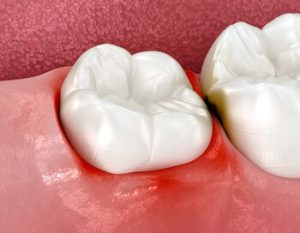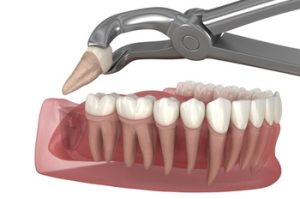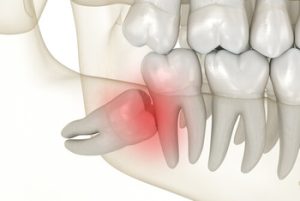Wisdom tooth pain can be anything from a dull ache to sharp, throbbing discomfort that throws your day off balance. If you’ve ever dealt with a troublesome wisdom tooth, you know just how frustrating it can be. As the final set of adult teeth emerge, these third molars often struggle for space, leading to pain, swelling, and irritation when they don’t grow in as they should.
For some, wisdom teeth may grow without any issues. However, many people experience pain due to impaction, infection, or crowding of surrounding teeth. If not addressed, wisdom teeth can cause intense dental pain, lead to gum infections, and potentially harm surrounding teeth.
In this guide, we’ll explore what causes wisdom tooth pain, how to relieve the pain at home, when wisdom teeth removal is necessary, and what to expect during and after dental surgery.
What Makes Wisdom Teeth So Painful?
Wisdom teeth, also known as third molars, are the final set of adult teeth to develop, usually erupting between the ages of 17 and 25. While the four wisdom teeth can develop without causing issues, many people experience pain due to a lack of space in the mouth or improper growth.
Here are the most common reasons why wisdom teeth cause pain:
- Impacted Wisdom Tooth:
An impacted wisdom tooth is one that does not fully emerge from the gum due to lack of space. This can cause severe pain, swelling, and pressure on other teeth. Impacted wisdom teeth may also develop infections, leading to further complications. - Partial Eruption:
When a wisdom tooth partially emerges, it creates a space where food and bacteria can collect, increasing the potential for infection, gum disease, and ongoing discomfort. - Tooth Decay:
Since wisdom teeth are positioned at the back of the mouth, they can be challenging to clean properly. Poor oral hygiene may lead to plaque buildup, increasing the likelihood of tooth decay, cavities, and gum inflammation, which can result in persistent pain and discomfort. - Pressure on Surrounding Teeth:
When wisdom teeth grow at the wrong angle, they may push against other teeth, leading to crowding and misalignment. This can make chewing food difficult and even cause pain in the upper jaw and lower jaw. - Gum Infection and Inflammation:
Swollen gums and inflammation around a painful wisdom tooth can lead to gum disease and throbbing pain. This can make it hard to maintain good oral hygiene, boosting the risk of infection.
Effective Home Remedies for Wisdom Tooth Pain Relief
If you’re experiencing wisdom tooth pain, several home remedies and over-the-counter treatments can help relieve the pain and reduce swelling. While these methods provide temporary relief, they are not a substitute for professional dental services.
1. Saltwater Rinse: A Natural Disinfectant
A saltwater rinse is a simple, easy and yet effective method to ease pain and swelling. Its natural disinfectant properties help reduce the risk of infection.
How to do it:
- Dissolve a few drops of salt in warm water.
- Rinse your mouth with the solution for 30 seconds before spitting it out.
- Repeat several times a day to keep the affected area clean.
2. Clove Oil: A Natural Numbing Effect
Clove oil has natural numbing and anti-inflammatory properties, making it an effective remedy for relieving wisdom tooth pain.
How to use it:
- Dip a cotton ball in a few drops of clove oil.
- Place it directly on the affected tooth and gum.
- Repeat as needed to relieve dental pain.
3. Over-the-Counter Pain Relievers
Over-the-counter painkillers like ibuprofen and paracetamol can help alleviate dental pain and reduce swelling. Stick to the recommended dosage and seek advice from a healthcare professional if the pain persists.
4. Ice Pack for Swelling and Jaw Pain
Applying an ice pack to the outside of your jaw can help minimise swelling and numb the pain.
How to use it:
- Place an ice pack in a towel and apply it to the affected area.
- Apply for 15-20 minutes at a time.
- Repeat several times a day for maximum relief.
5. Warm Water Rinse for Gum Infection
If your swollen gums are causing persistent pain, rinsing with warm water can help soothe the affected area and remove trapped food particles.
6. Avoid Chewing on the Affected Side
If you have severe pain from a wisdom tooth, avoid chewing food on the affected side to prevent further irritation.
When Should You Consider Wisdom Teeth Removal?
Natural remedies may offer short-term relief, but they won’t fix the underlying problem. If your wisdom tooth pain is persistent, you may need to consider wisdom teeth removal.
Signs You Need Your Wisdom Teeth Removed
- Persistent pain and discomfort that doesn’t go away with home remedies.
- Swollen gums and gum infection, which may lead to gum disease.
- Pressure on surrounding teeth, causing misalignment or chewing difficulties.
- Bacteria accumulation in difficult-to-clean areas can lead to bad breath.
- Difficulty maintaining good oral hygiene due to partially emerged wisdom teeth.
What to Expect During Wisdom Teeth Removal
Wisdom teeth removal is a common dental procedure performed to prevent or treat pain, infections, and overcrowding. Here’s a brief overview of what to expect:
- Pre-Surgery Examination: A dental professional will examine your wisdom teeth using X-rays to determine if they need to be removed.
- The Extraction Procedure: Wisdom teeth removal is performed under local anaesthesia, sedation, or general anaesthesia. The dentist will remove the tooth, sometimes in sections, if it is impacted.
- Post-Surgery Care: After the procedure, follow these steps to promote healing and relieve the pain:
- Use pain relievers as prescribed.
- Apply ice packs to reduce swelling.
- Avoid smoking, alcohol, and hard foods.
- Opt for soft foods such as yoghurt, soup, and mashed potatoes to avoid aggravating the affected area.
- Keep the extraction site clean with saltwater rinses.
Can Wisdom Teeth Pain Be Prevented?
Although wisdom tooth pain isn’t always avoidable, taking these steps can help minimise the risk of complications.
- Maintain Good Oral Hygiene:
- Brush and floss daily to stop food and bacteria from accumulating around wisdom teeth.
- Regular Dental Check-Ups:
- Regular visits to a dental professional enable them to track wisdom tooth development and advise removal if needed.
- Address Dental Pain Early:
- If you experience toothache, sore jaw, or persistent pain, don’t ignore it. Early intervention can prevent complications.
Types of Wisdom Tooth Impaction
Wisdom teeth do not always emerge properly. Due to limited space in the mouth, they may become impacted, meaning they fail to fully erupt through the gums. There are three main types of impaction:
Soft Tissue Impaction
Soft tissue impaction develops when a wisdom tooth remains partially covered by gum tissue, preventing it from fully erupting. This condition often results in inflamed gums, pain, and an increased risk of infection.
- Trapped food and bacteria beneath the gum flap can cause swollen gums and lead to infections.
- The affected area may develop throbbing pain, tenderness, and bad breath due to bacterial buildup.
- Soft tissue impactions are sometimes treatable with improved oral hygiene, but extraction may be necessary if pain persists.
Partial Bony Impaction
A partially impacted wisdom tooth emerges partially but remains stuck in the jawbone. This can lead to:
- Crowding of surrounding teeth, causing misalignment.
- Difficulty maintaining good oral hygiene, increasing the risk of tooth decay and gum disease.
- Persistent pain and inflammation often require wisdom teeth removal to prevent further complications.
Complete Bony Impaction
In cases of complete bony impaction, the wisdom tooth remains fully trapped within the jawbone, unable to erupt. This is the most severe form of impaction, requiring surgical extraction.
- It may cause chronic pain and jaw stiffness.
- This can lead to cyst formation around the affected tooth, potentially damaging the jawbone and surrounding teeth.
- Often detected through X-rays during routine dental visits.
The Link Between Wisdom Tooth Pain and Other Health Issues
Wisdom tooth pain is more than just a dental issue—it can affect various aspects of your health, from jaw pain to sinus problems and even headaches. If left untreated, problematic wisdom teeth can contribute to chronic pain, infections, and complications beyond the mouth. Here’s how wisdom tooth pain can impact overall health.
Jaw Pain and TMJ Disorders
Wisdom teeth that grow at an incorrect angle or become impacted can put excessive pressure on the temporomandibular joint (TMJ), leading to chronic jaw pain and TMJ disorders.
Signs that wisdom teeth are affecting the jaw joint:
- A sore jaw that worsens when chewing or talking.
- A clicking or popping sound when moving the jaw.
- Trouble opening and closing the mouth properly.
- Tension headaches are caused by muscle strain around the jaw.
If left untreated, TMJ issues can lead to long-term joint dysfunction, requiring physical therapy or additional treatments to restore proper movement.
Connection to Sinus Problems and Headaches
Wisdom teeth in the upper jaw are situated near the sinus cavities, and if they grow improperly, they can exert pressure on these air-filled spaces. This can lead to sinus-related symptoms, including:
- Sinus pressure and congestion, especially in the morning.
- Frequent headaches and facial pain.
- Increased risk of sinus infections (sinusitis).
The pressure caused by an impacted wisdom tooth can mimic sinus pain, making it difficult to differentiate between a dental issue and a sinus condition. If you experience persistent headaches, nasal congestion, or sinus pressure, a dental examination may help determine if your wisdom teeth are the cause.
Teeth Grinding (Bruxism) and Wisdom Tooth Pain
Wisdom tooth pain can also contribute to bruxism (teeth grinding), especially at night. When there is discomfort or misalignment due to an impacted wisdom tooth, the body may react by clenching or grinding the teeth unconsciously.
Effects of teeth grinding caused by wisdom tooth pain:
- Increased jaw pain and stiffness in the morning.
- Worn-down tooth enamel, leading to increased sensitivity.
- Risk of a broken tooth or cracked molars.
- Tension headaches are caused by excessive pressure on the jaw muscles.
If teeth grinding is ignored, it can result in long-term damage to the teeth and jaw, making wisdom tooth removal an essential step in relieving pain and discomfort.
Gum Infections and Inflammation Spreading Beyond the Mouth
Partially erupted wisdom teeth can form pockets in the gums, allowing food particles and bacteria to collect. This can lead to pericoronitis, a painful gum infection that, if left untreated, may spread to other areas of the mouth and body.

- Swollen gums around the wisdom tooth.
- Redness and tenderness in the affected area.
- Bad breath due to bacterial buildup.
- Pus or drainage from the gums.
In severe cases, a wisdom tooth infection can spread beyond the mouth, leading to systemic infections that affect overall health. Infections that reach the jawbone or bloodstream can cause serious medical complications, requiring immediate treatment.
Neck and Facial Pain Due to Wisdom Teeth
Wisdom tooth pain is not always limited to the mouth—it can radiate to other areas, including the neck, ears, and face.
How wisdom teeth can cause pain in other areas:
- Ear pain due to pressure on the nerves near the jaw.
- Neck stiffness and discomfort from prolonged jaw tension.
- Facial swelling and tenderness in the lower or upper jaw.
If you experience unexplained pain in your ear, neck, or face, and no other medical cause is found, your wisdom teeth may be the underlying issue.
Foods to Eat and Avoid When You Have Wisdom Tooth Pain
Best Foods for Wisdom Tooth Pain Relief
- Mashed potatoes – Soft and easy to eat.
- Yoghurt – Contains probiotics to support gum health.
- Smoothies – Nutrient-packed and require minimal chewing.
Foods to Avoid
- Crunchy snacks like chips and nuts.
- Sticky sweets that can get trapped in gum pockets.
- Spicy foods can irritate inflamed gum tissue.
Is Wisdom Tooth Pain Worse at Night?
Yes, wisdom tooth pain can often feel worse at night, and there are several reasons for this. One of the main factors is increased blood flow to the head when lying down, which can intensify throbbing pain and pressure in the affected area. During the day, distractions like work, conversations, and eating may take your focus off the discomfort, but at night, when you’re trying to relax, the pain becomes more noticeable. Additionally, clenching or grinding teeth (bruxism) while sleeping can put extra pressure on an already inflamed wisdom tooth, worsening the pain and causing jaw soreness in the morning. Sleeping in a flat position may also allow fluids to accumulate, leading to more swelling and discomfort. To manage wisdom tooth pain at night, try elevating your head with an extra pillow, using an ice pack before bed, or taking over-the-counter pain relievers to help minimise inflammation and discomfort while sleeping.
What Happens If You Don’t Remove a Problematic Wisdom Tooth?
Ignoring a problematic wisdom tooth can lead to serious oral health issues, including pain, infections, and damage to surrounding teeth. If a wisdom tooth is impacted, misaligned, or decayed, delaying removal may result in more complex dental problems and acute dental pain that worsens over time.
- Increased Risk of Infection and Abscesses
- Partially erupted wisdom teeth trap food and bacteria, leading to swollen gums, pain, and bad breath. If untreated, infections can spread, causing abscesses that require urgent treatment.
- Damage to Nearby Teeth
- Impacted wisdom teeth can press against other teeth, leading to tooth decay, fractures, and misalignment. This may undo years of orthodontic work and increase dental sensitivity.
- Cysts and Jawbone Damage
- An impacted wisdom tooth can form a fluid-filled cyst, potentially harming the jawbone, nerves, and nearby teeth. Left untreated, it may require surgical removal.
- Jaw Pain, TMJ Disorders, and Acute Dental Pain
- Misaligned wisdom teeth put pressure on the jaw joint (TMJ), leading to jaw stiffness, sore jaw, and difficulty opening the mouth. This pressure can result in acute dental pain, making everyday activities like chewing and speaking uncomfortable.
- Higher Risk of Gum Disease
- Wisdom teeth that are hard to clean accumulate plaque, increasing the risk of gum infections, recession, and even tooth loss due to periodontal disease.
- Sinus Pressure and Headaches
- Upper wisdom teeth may press against sinus cavities, causing congestion, facial pain, and recurring headaches that worsen over time.
- Teeth Grinding (Bruxism) and Sensitivity
- Wisdom tooth pain can contribute to teeth grinding, leading to worn-down enamel, increased tooth sensitivity, and jaw soreness.
- Difficulty Chewing and Swallowing
- Painful wisdom teeth make chewing food difficult, often leading to swelling, jaw imbalance, and discomfort while eating.
- Chronic and Worsening Pain
- Untreated wisdom tooth pain can become persistent and severe, leading to acute dental pain that interferes with daily life, sleep, and overall well-being. If discomfort lasts more than a few weeks, removal is likely necessary.
Final Thoughts

If you’re experiencing severe pain, gum infections, or pressure on surrounding teeth, contact Finesse Dental at (02) 8806 0790. Wisdom teeth removal is often the best solution for impacted or misaligned wisdom teeth, providing long-term relief and preventing future dental issues.
Note: Any surgical or invasive procedure carries risks. Before proceeding, you should seek a second opinion from an appropriately qualified health practitioner.
References
- Mayo Clinic. (n.d.). Wisdom tooth extraction. Retrieved from https://www.mayoclinic.org/tests-procedures/wisdom-tooth-extraction/about/pac-20395268
- National Center for Biotechnology Information. (n.d.). Local Anesthesia Techniques in Dentistry and Oral Surgery. Retrieved from https://www.ncbi.nlm.nih.gov/books/NBK580480/
- Cleveland Clinic. (n.d.). Bad breath (halitosis). Retrieved from https://my.clevelandclinic.org/health/diseases/17771-bad-breath-halitosis
- WebMD. (n.d.). Temporomandibular disorders (TMD). Retrieved from https://www.webmd.com/oral-health/temporomandibular-disorders-tmd
- Healthline. (n.d.). Salt water rinse for oral health. Retrieved from https://www.healthline.com/health/dental-and-oral-health/salt-water-rinse
- Medical News Today. (n.d.). What to know about cysts. Retrieved from https://www.medicalnewstoday.com/articles/160821


